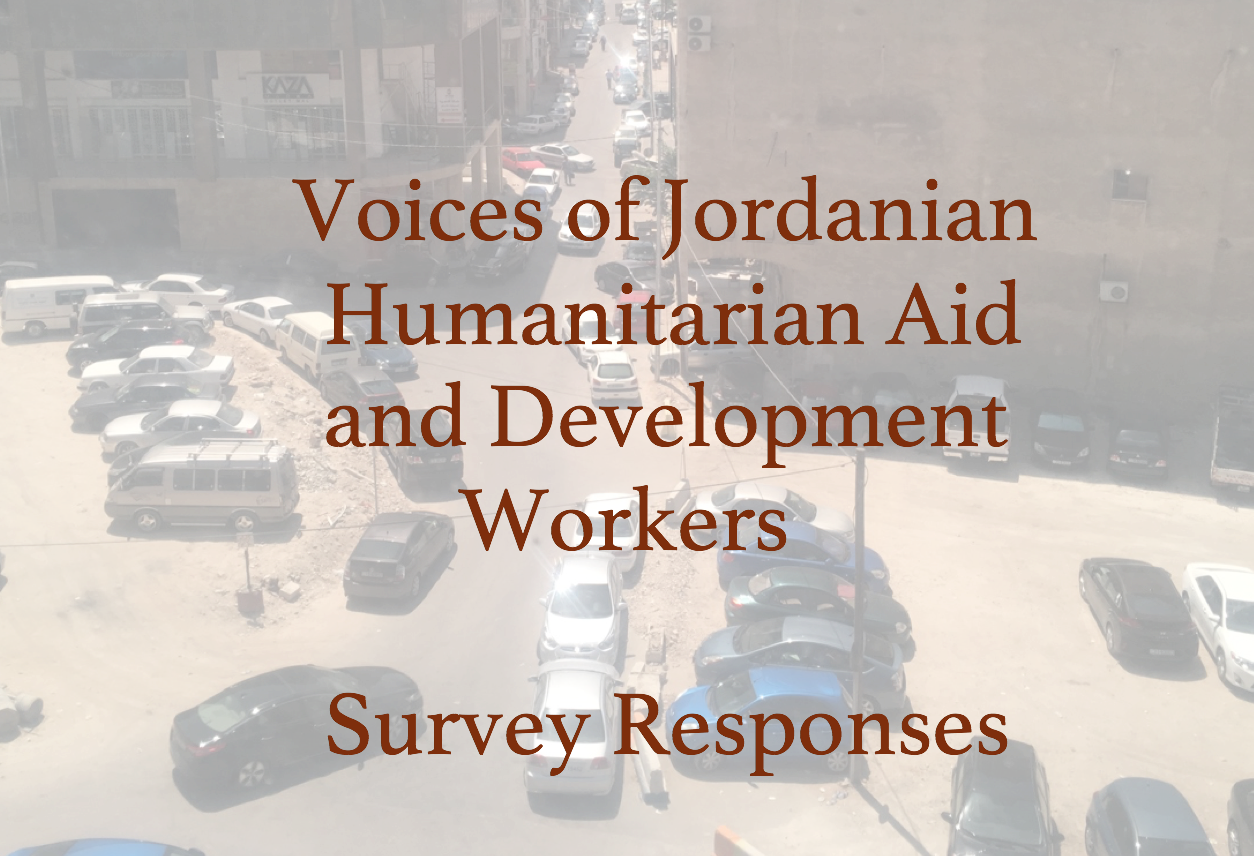Overview of remaining survey data from Jordanian aid workers
More results from the Jordanian humanitarian worker survey.
Where we have been
In the past months I have presented and commented on the survey data from a small (n =86) sample of Jordanian humanitarian aid workers. To date I have made over two dozen posts covering several major sections of the survey, addressing such topics as perceptions of the working relationship between ‘local’ and ‘expat’ aid workers, the mental health stressors faced by national staff, how marital status impacts work expectations, and even the ‘diversity’ question. My posts have been a blend of data presentation -numbers and graphs- combined with contextual comment and sociological reflections in equal measure.
 Where we are going
Where we are going
In the next several weeks I will complete the preliminary analysis of and comment on the data in additional blog posts. Some important topics are yet to be covered.
Here are a few of the survey questions on which I’ll present data and comment on in the near future:
- “Globally, international aid organizations can seem to play a dominant role in shaping the aid sector as compared to national or local humanitarian aid organizations. Do you see this changing in Jordan?”
- “Which statement below best describes your experience with the misuse of power or funds by people working for NGOs in Jordan?”
- “In general, to what extent do you see a gap between donor interests and the needs of the affected communities?”
- “How does the gap between donor interests and the needs of the affected communities impact your work and motivation?”
- “In doing your job to what extent do you feel like you have the freedom to contribute new ideas, approaches, and practices?”
- “Do you feel that there is a need for an organization whose primary mission is to represent the needs of humanitarian workers in Jordan?”
What I have learned so far
As with in any branch of inquiry, the more you learn the more you realize that there is, well, more to learn. Deeper scrutiny leads to more questions. I liken this to looking at my arm just now as I am typing. I known that with even a weak microscope I could see  cracks and fissures not perceptible by the naked eye, and with increased magnification I would discover ever more detail and nuance.
cracks and fissures not perceptible by the naked eye, and with increased magnification I would discover ever more detail and nuance.
The same is so for learning about what Jordanian humanitarian aid workers feel and think; there is only increasing complexity. As I read through the narrative responses I am constantly struck by the fine distinctions that are being made and the very subtle -yet critically important- shades of perception that are expressed.
What I can say about the data so far is that the issues, opinions, and feelings of Jordanian aid workers sound very much like of those I heard from Filipino national staff. Though each setting is very different environmentally, politically, and the overall presence of the aid sector, I have found a remarkable similarity of voice and tone when comparing the Jordanian and Filipino survey responses.
A look into the future: Iraqi voices
The long term goal of this project is to put together a book similar to Aid Worker Voices, this time with a demonstrative focus on ‘local’ or ‘national’ aid worker voices. As I worked with humanitarian contacts in Amman on the current survey the decision was made to have one version of the survey in English.
I am now working with colleagues in Iraq to replicate the Jordanian survey, though this time we will make both English and Arabic versions accessible. Our working assumption is that an Arabic version will reach more respondents, especially those working in more first-line positions (drivers, staff working in camps, etc). We will proceed deliberately, making sure to alter the survey to fit the Iraqi context (more specifically in Erbil), and more importantly proceeding with the ultimate goal being to serve Iraqi humanitarians, presenting the voices they share with accuracy and with deep respect for the humanity represented in each utterance.
All for now. Please contact me if you have any comments or questions.


 Follow
Follow